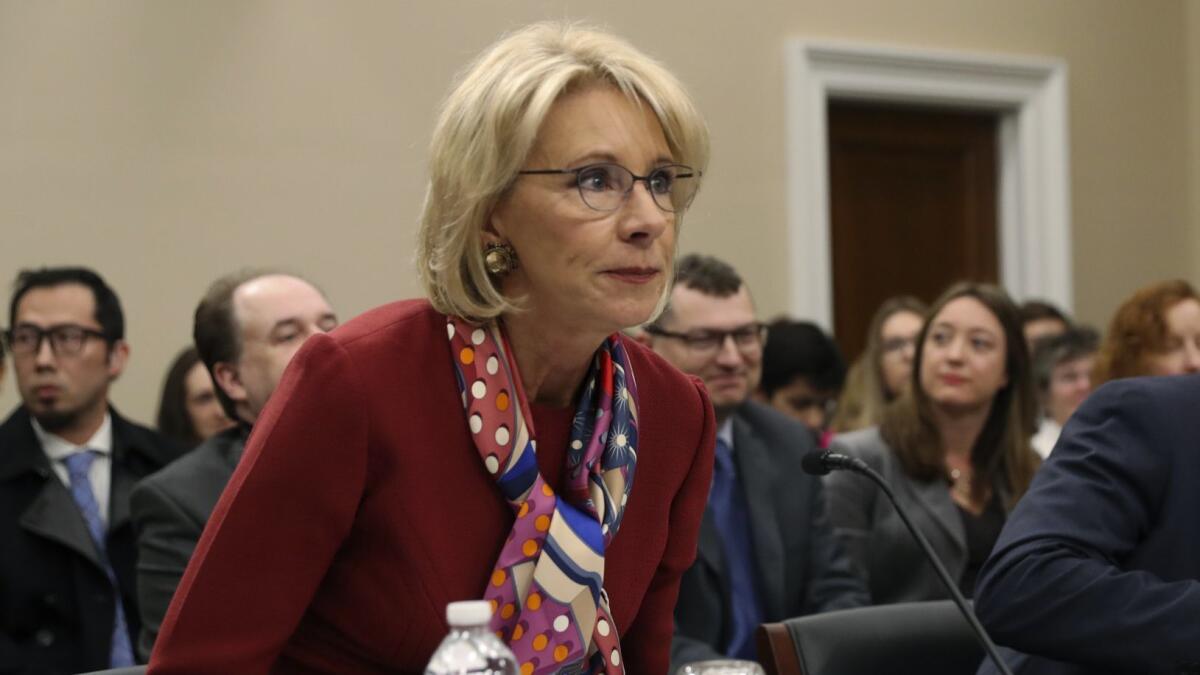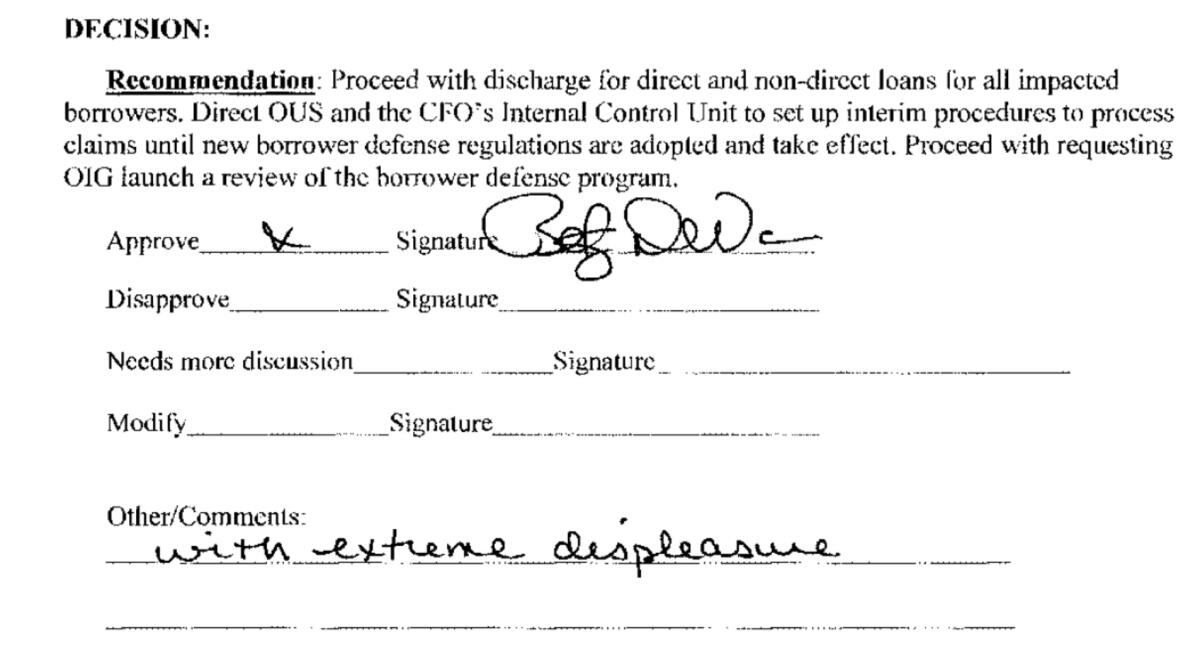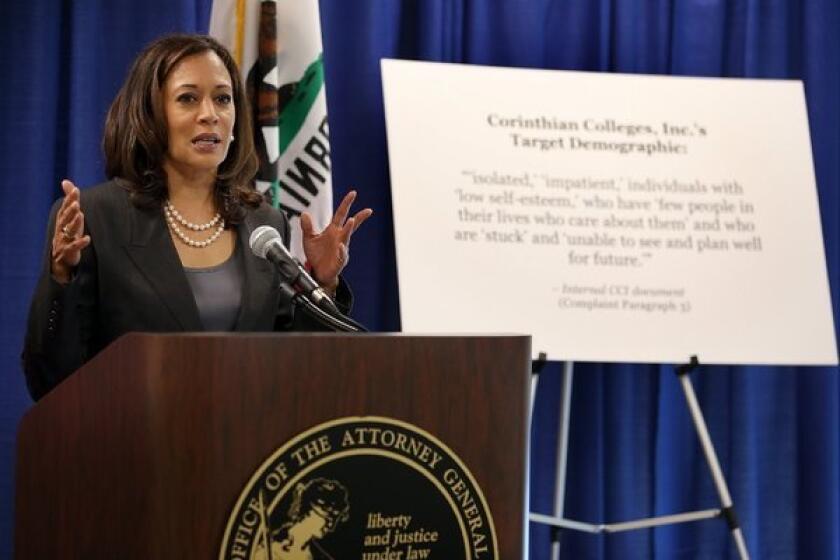Column: In Corinthian Colleges fiasco, Education Secretary Betsy DeVos’ actions define ‘contempt’

As is true of many legal concepts, “contempt of court” can be inexact in its definitions or implications. But that doesn’t seem to be the case when it comes to Education Secretary Betsy DeVos and her department’s treatment of thousands of students defrauded by the for-profit company Corinthian Colleges.
U.S. Magistrate Judge Sallie Kim in San Francisco on Oct. 24 slapped DeVos and her agency with a $100,000 sanction for civil contempt.
Kim found that, despite her having ordered DeVos’ agency in 2018 to cease collecting on federal loans taken out by the defrauded students, the Education Department had sent payment demands to 16,034 students. They included 847 whose credit reports had been dinged by the agency and 1,808 whose paychecks had been garnisheed or whose tax refunds had been withheld.
The [for-profit education] sector feels like they’ve never had a better friend in the federal government than Betsy DeVos.
— Eileen Connor, Harvard Law School
“There have to be some consequences for the violation of my order 16,000 times,” Kim ruled.
Kim’s ruling, stern as it is, fails to communicate the full flavor of the contempt DeVos and her department have shown toward those students — and students of other dishonest firms in the for-profit higher education sector — as well as for the processes established years ago to grant them loan forgiveness.
Don’t expect DeVos to feel the pain from Kim’s sanction. Although she’s an heiress by marriage to the DeVos family’s Amway merchandising fortune and estimated to be worth more than $1 billion, she won’t be getting the bill for the contempt citation — it goes to the taxpayers.
Those feeling the pain are the former Corinthian students, who were cheated of the opportunity to better themselves, and some of whom still struggle to make ends meet because the government hasn’t resolved their claims.
A federal magistrate has blocked the U.S.
DeVos’ undermining of the forgiveness procedure started almost instantly after her confirmation as Education secretary in February 2017. She put a hold on a system that had been crafted under the Obama administration that effectively granted former Corinthian students full recompense on their government loans. Nearly a year later, she substituted an alternative process that was so legally flawed it was blocked by Judge Kim.
DeVos seemed to take the position that many, if not most, borrowers were intent on gaming the Obama system, claiming relief they didn’t deserve. She justified revoking the Obama-era program on grounds that “under the previous rules, all one had to do was raise his or her hands to be instantly entitled to so-called free money.” Told that she was legally bound to sign off on approvals for loan forgiveness that had been granted under Obama but not yet formalized, she added a handwritten note indicating she was signing the papers “with extreme displeasure.”

Meanwhile, she hasn’t shown the same skepticism toward the for-profit sector, appointing veterans of the industry to high-level jobs at the Education Department — including positions with direct oversight of the industry.
“The sector feels like they’ve never had a better friend in the federal government than Betsy DeVos,” says Eileen Connor of the Project on Predatory Student Lending at Harvard Law School, who represents plaintiffs in the lawsuit over the Corinthian settlement.
Even after her department was raked over the coals by Judge Kim, DeVos tried to minimize her agency’s poor performance. “Loan servicers made an error on a small # of loans,” she tweeted. “We know & we’re fixing it.” Of course, the violation was her department’s, not the loan servicers’ — the department itself conceded in a report to the judge in September that it maintains “responsibility for the administration of its student loan portfolio” — and the “small #” was 16,000. DeVos, incidentally, couldn’t resist using her tweet to accuse Sen. Elizabeth Warren (D-Mass.), one of her most vocal critics, of lying.
In response to my request for further comment, the department referred me to a video featuring Mark Brown, chief operating officer of its Federal Student Aid unit, that was prepared after the contempt ruling. Brown asserts that refunds have been made to 99% of the borrowers who made payments on their loans or who had their wages or tax refunds garnisheed and that the department was working to correct credit reports for all the borrowers. Like DeVos, Brown blamed loan service firms for having “mistakenly billed” the borrowers. He also said, “We take full responsibility... We did not meet our own standard.”
A few words are warranted here about the company at the center of this case.
As has been amply documented in lawsuits and a congressional investigation, Corinthian Colleges victimized tens of thousands of typically low-income and minority students before it collapsed in 2015. The students were enticed by falsified job placement statistics to take out federal loans and spend those funds and their personal savings on technical and vocational programs.
Corinthian, a publicly traded company headquartered in Santa Ana, played a starring role in an investigation of the for-profit college industry conducted by a Senate committee in 2012. The committee reported that Corinthian, where the admissions staff was drawn chiefly from the ranks of salespersons and marketers rather than education professionals, had some of the highest student loan default rates and lowest student retention rates in the for-profit sector.
At its peak in 2009 and 2010, the committee said, Corinthian enrolled more than 113,000 students at 105 campuses in 25 states and online under the names of Everest, Heald College and WyoTech and collected some $1.7 billion in federal student aid.
Eventually the scam came crashing down. California then-Atty. Gen. Kamala Harris sued the firm in 2013, eventually winning a default judgment of $1.1 billion. More than 20 other states mounted their own investigations, and the federal Consumer Financial Protection Bureau filed its own lawsuit alleging deceptive practices in 2014. The Education Department itself fined Corinthian $30 million in 2015 for “substantial misrepresentations” of job placement rates.
Why would Leon Panetta, Marc Morial join for-profit Corinthian?
Corinthian’s insiders spent the years before its collapse riding high. Jack D. Massimino, its chairman and chief executive, collected $9.6 million in pay in 2011-13; Robert C. Owen, its chief financial officer, was paid $2.6 million over the same period.
The company recruited to its board former Secretary of Defense and U.S. Rep. Leon Panetta and former New Orleans Mayor Marc Morial, then (and still) CEO of the National Urban League with $60,000 a year in pay and $90,000 in deferred stock grants.
When the reckoning eventually came, however, the government treated Corinthian’s leaders with kid gloves. In March, the Securities and Exchange Commission settled its fraud case against Massimino and Owen for a pittance — $80,000 and $20,000, respectively. Neither had to admit wrongdoing and neither is barred from serving again as an officer or director of another publicly traded company. Some of the students who got nothing out of their high-priced Corinthian “education” ended up owing more than that for programs that charged tuition as high as $75,000 a year.
In a letter to SEC Chairman Jay Clayton, Warren and fellow Democratic Sens. Richard J. Durbin of Illinois, Sherrod Brown of Ohio and Richard Blumenthal of Connecticut called the settlement “shocking in its failure to appropriately hold these executives accountable for what they accurately termed “the largest collapse of an institution of higher education in American history.”
Corinthian Colleges was a higher-education scam that defrauded tens of thousands of low-income students out of as much as $100 million in federally backed loans.
DeVos hasn’t made any secret of her indulgence toward the for-profit education sector. Among her earliest appointees was Julian Schmoke, a former dean of for-profit DeVry University, as chief enforcement officer and head of the Student Loan Enforcement Unit; in 2016, DeVry agreed to a $100-million settlement of Federal Trade Commission charges that it misled students with bogus employment statistics, covering some activities that took place while Schmoke was employed at DeVry.
Among DeVos’ other appointees were Diane Auer Jones, a former executive of Career Education Corp., which in 2013 had paid $10.5 million to settle a New York state investigation into inflated graduate employment claims, as principal deputy undersecretary (Jones served at CEC from 2010 to 2015); and Robert Eitel, a former executive at Bridgepoint Education and Career Education, as a senior advisor.
The loan forgiveness program that DeVos overturned had been crafted by the Obama administration to reflect Corinthian’s flagrant fraud. It offered fast-track relief to former students, canceling their outstanding federal loans and refunding money they already had paid. The government reached out to more than 300,000 former students to inform them of the program, and by Jan. 20, 2017, had processed more than 27,000 claims.
On that date, President Trump’s inauguration, the program stopped dead. By December 2017, the backlog had reached 99,000 applications. The following month, DeVos announced an “improved” system in which the average income of borrowers in a given Corinthian program would be compared with the earnings of graduates from a non-Corinthian program. The debt relief would be reflected in that ratio — in other words, Corinthian borrowers earning 60% of the control group’s income would be granted relief on 40% of their loan.
A raft of recent studies about school vouchers couldn’t have come at a worse time for our new Secretary of Education Betsy DeVos.
The plaintiffs in the Corinthian lawsuit termed this arrangement “illegal in at least seven different ways.” Judge Kim focused on the department’s use of Social Security records to make its calculations, which she concluded was a violation of federal privacy law. She issued an injunction halting the new system and ordered the department to “cease all efforts to collect debts” from former students who had filed for relief.
DeVos’ department displayed indifference to the court order. As Kim observed, the department made only minimal effort to inform the nine loan servicing firms it had under contract to deal with borrowers, sending them “a single email with three brief sentences of instruction” and not even mentioning that a federal court order was in place.
Government lawyers acknowledged that the department hadn’t complied with the injunction, but said it had been “working diligently” to rectify its failure. They argued that a contempt sanction would only “divert ... unnecessarily” the department’s effort to comply.
Kim wasn’t having any of it. At an Oct. 7 hearing, according to court filings, she depicted the department’s attitude to be “at best ... almost gross negligence of the magnitude of ‘we don’t care about the order, we’re going to do the minimal amount of effort we need’” and “at worst, it’s intentional flouting.” She said she was “astounded, really, just really astounded” at the “sheer scale of violations” of her injunction.
Nothing in Kim’s ruling will force DeVos or her department to perform better. DeVos is immune from the financial consequences of her performance, and judging from her record, immune from shame at leaving defrauded students hanging.
Some veterans of the for-profit higher education sector are still in place at the department, crafting policies that overlook the true nature of an industry bubbling over with fraud and deceit. If the authors of the next legal dictionary are seeking a solid definition of “contempt,” they need look no further than the Department of Education.
More to Read
Inside the business of entertainment
The Wide Shot brings you news, analysis and insights on everything from streaming wars to production — and what it all means for the future.
You may occasionally receive promotional content from the Los Angeles Times.













